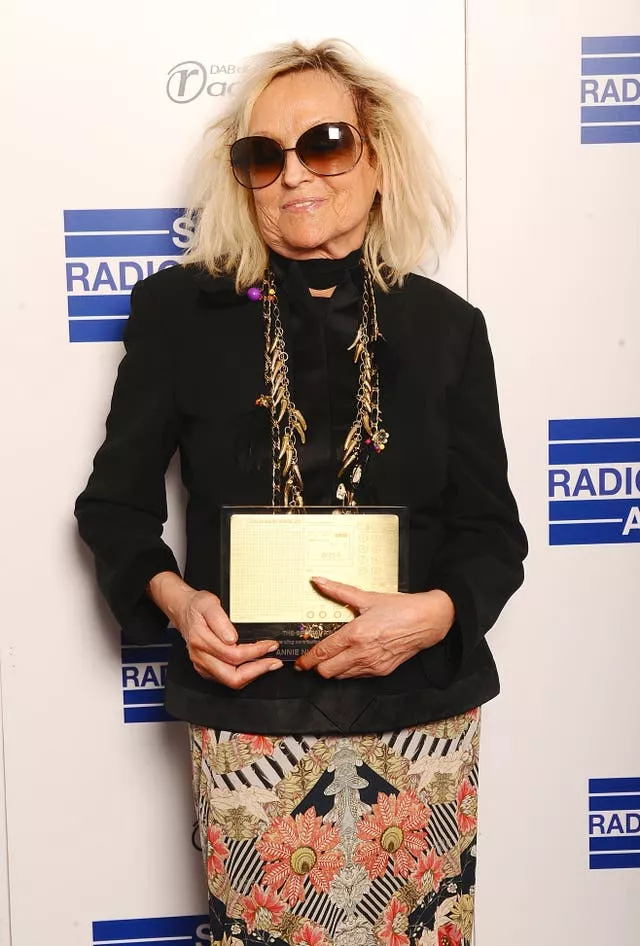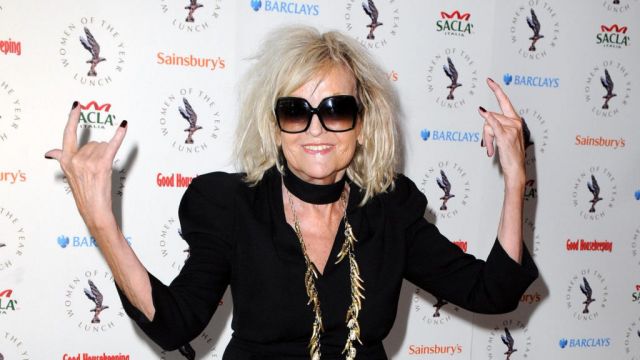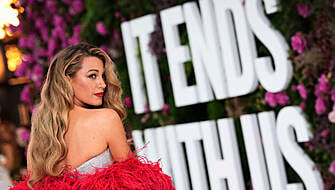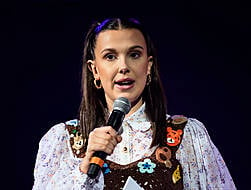Zoe Ball and Annie Mac have hailed veteran DJ Annie Nightingale as the “original trailblazer for women in radio” following her death aged 83.
Nightingale became the first female presenter on BBC Radio 1 when she joined the station in 1970, and went on to become its longest-serving host.
Female DJs and presenters were among those to praise her for paving the way following the news that she died on Thursday at her London home after a short illness.
Annie Nightingale ✨
heartbroken to hear the news. the original trailblazer for us women in radio
she loved music like no other… and could out last any of us at the party
so grateful for all the love & support she offered me over the years
what a dame… rest well ❤️ pic.twitter.com/nwPpfb7KqP— Zoe Ball (@ZoeTheBall) January 12, 2024
Advertisement
Ball, who hosts BBC Radio 2’s breakfast show and previously helmed the show on Radio 1, said she was “heartbroken” to hear the news as she described Nightingale as “the original trailblazer for us women in radio”.
She added: “She loved music like no other… and could out last any of us at the party.
“So grateful for all the love & support she offered me over the years. What a dame… rest well.”
Annie Mac, who hosted a variety of Radio 1 shows before leaving in 2021 after 17 years, described Nightingale as a “trailblazer, spirited, adventurous, fearless, hilarious, smart, and so good at her job”.
Alongside a black-and-white photo of a young Nightingale, she wrote: “This is the woman who changed the face and sound of British TV and Radio broadcasting forever. You can’t underestimate it.
“Before Annie Nightingale came on Radio 1, it was legitimately believed by BBC bosses that people didn’t want to hear women’s voices on the radio.
“Radio DJs were seen as husband substitutes for the wives who listened at home. God forbid British women might want to listen to other women.”
View this post on InstagramAdvertisement
The Dublin-born DJ, who real name is Annie Macmanus, said Nightingale “smashed through all the sexist stereotypes of what kind of broadcaster a woman should be” and continued on through until she was an older woman who played underground music on Radio 1.
She added: “She was always the epitome of ‘cool’, relentlessly curious and enthusiastic and hungry to learn. She always had the messiest desk in our office, the best outfits, and the most outrageous stories to tell. She was so sound!
“I hope stages and festivals and awards will be named in her honour for decades to come. Queen of breaks! Annie Nightingale, you absolute legend, may you always be ‘on One’.”
BBC Radio 2 presenter Jo Whiley also thanked Nightingale as she called her “the coolest woman who ever graced the airwaves”.
“She blazed a trail for us all and never compromised. Her passion for music never diminished. Annie – My utmost respect and thanks for it all. Much love Jo”, she added.
Glastonbury Festival co-organiser Emily Eavis remembered her as “an inspiration to so many women in music” and a “lovely human being”.
She also recalled: “Annie gave me so much support when I was in my twenties, I always felt so grateful to have such a strong woman encouraging me along the way and I’m sure she has done the same for many others like me.”
Radio 1 Breakfast Show host Greg James said being in the presence of Nightingale was “such a treat” and she will be missed “so much”.
While host of Radio 1’s Dance Party, Danny Howard, said she was an “all time radio great” and a “kind soul”.
Fellow veteran presenter Trevor Nelson said Nightingale made him “feel like music broadcasting is for life”, adding: “Rave in peace.”
Nightingale first broadcast on the BBC in 1963 as a panellist on Juke Box Jury, before joining Radio 1 seven years later.
She remained the station’s only female DJ until 1982, when Janice Long joined, and is credited with helping to pave the way for the likes of Sara Cox, Whiley and Ball.
Alongside this, she was also the first woman to present the BBC’s Old Grey Whistle Test music show which aired on BBC Two.
In 2021, BBC Radio 1 launched a new scholarship for female and non-binary dance music DJs which was named after Nightingale.
BBC Radio 1 is extremely saddened to hear of the passing of Radio 1 DJ, Annie Nightingale CBE. Our deepest condolences are with Annie’s friends and family at this incredibly difficult time.
Rest in peace, Annie 🤍 pic.twitter.com/oXbpZz5Me1— BBC Radio 1, 1Xtra & Asian Network Press Office (@BBCRadio1PR) January 12, 2024
Up until recently she still hosted her show Annie Nightingale presents… on BBC Radio 1.
In a statement reported by the BBC, her family said: “Annie Nightingale MBE passed away yesterday at her home in London after a short illness.
“Annie was a pioneer, trailblazer and an inspiration to many. Her impulse to share that enthusiasm with audiences remained undimmed after six decades of broadcasting on BBC TV and radio globally.”
The statement added that a celebration of her life will be taking place in the spring at a memorial service.
The head of BBC Radio 1, Aled Haydn Jones, said the station was “devastated” to lose Nightingale and sent the team’s condolences to her family and friends.
He added: “Annie was a world class DJ, broadcaster and journalist, and throughout her entire career was a champion of new music and new artists.
“She was the first female DJ on Radio 1 and over her 50 years on the station was a pioneer for women in the industry and in dance music.
“We have lost a broadcasting legend and, thanks to Annie, things will never be the same.”
As a DJ she has travelled the world, and once said she had been “mugged in Cuba, drugged in Baghdad and bugged in Russia”.
Over the years, she rubbed shoulders with music titans including the late David Bowie, who she brought to a pub after watching him open for another band, to praise his talent when she was aged 22.

She also befriended The Beatles and was a guest on occasion at the band’s Apple Studios in London during the 1960s.
During a special show with former BBC Radio 1 host Nick Grimshaw she told him that Sir Paul McCartney once “sort of” proposed to her, adding: “But I don’t think he was serious.”
She documented her pioneering career and the evolution of five decades of pop culture in her 2020 memoir Hey Hi Hello.
In 2019, she was made a CBE for services to radio having previously been made an MBE in 2002.
BBC director-general Tim Davie said Nightingale was a “uniquely gifted broadcaster” and hailed her as a “champion for female broadcasters” as he paid tribute.
“I’m deeply saddened by Annie’s passing and our thoughts are with her family, many friends and the whole of Radio 1,” Mr Davie said.
“Annie was a uniquely gifted broadcaster who blessed us with her love of music and passion for journalism, for over 50 years.
“As well as being a trailblazer for new music, she was a champion for female broadcasters, supporting and encouraging other women to enter the industry. We will all miss her terribly.”







